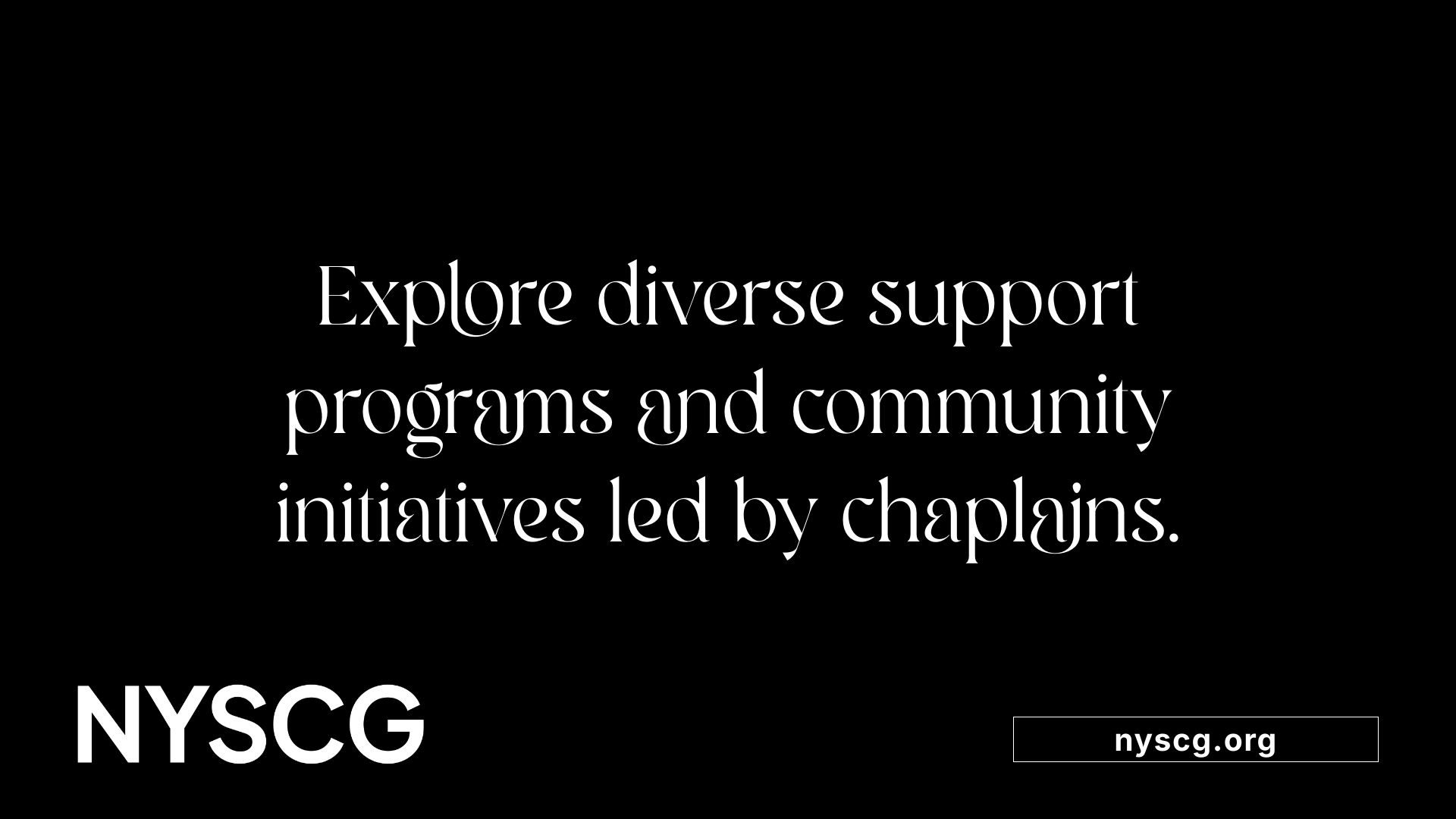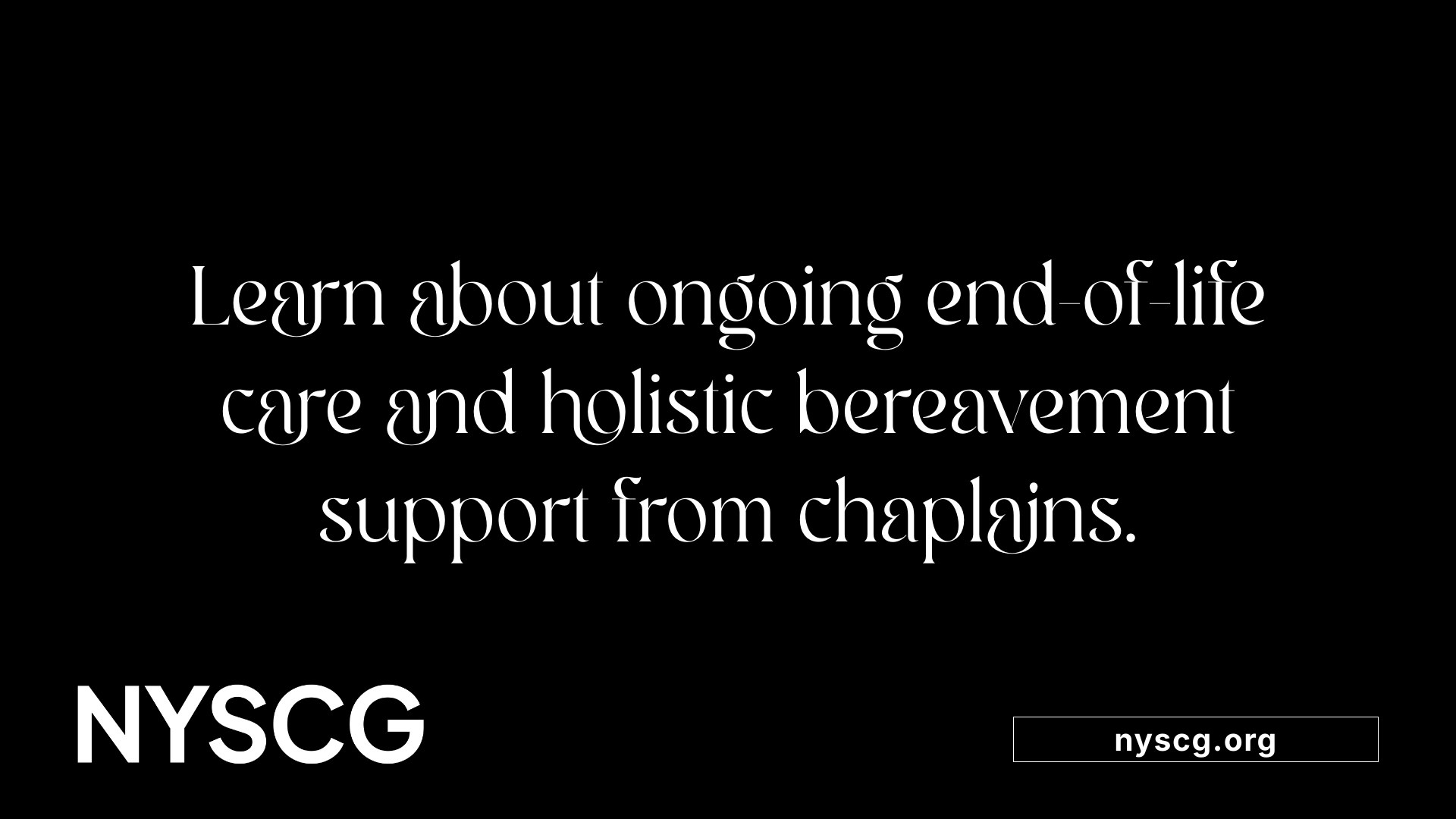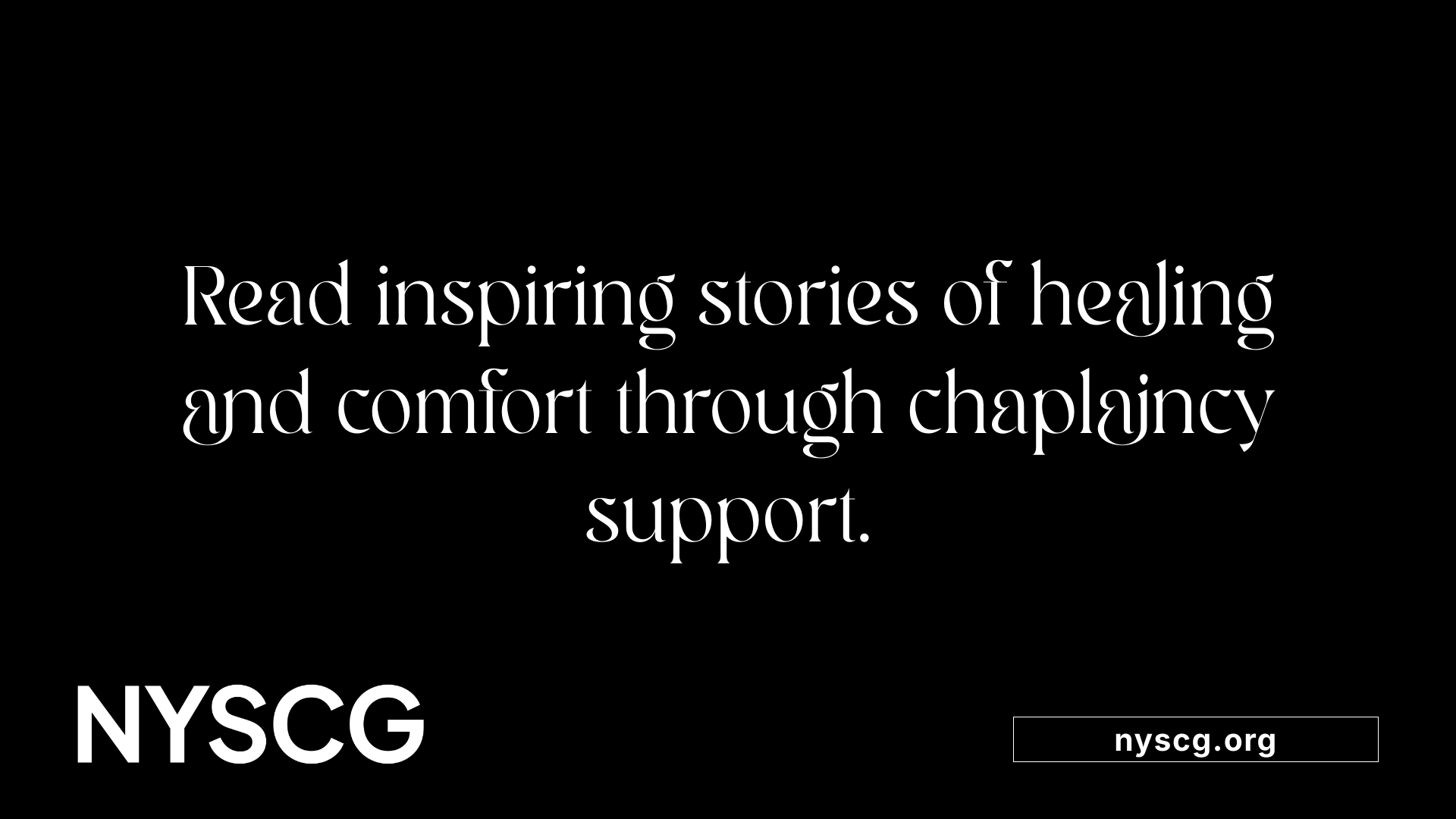Grief Recovery Support: How Chaplains Help Beyond the Funeral


While funerals often mark the end of rituals surrounding death, the journey of grief extends far beyond these ceremonies. Chaplains play a crucial role in providing compassionate, holistic support that addresses emotional, spiritual, and practical needs throughout the grieving process. From facilitating support groups to offering individual counseling in hospitals, workplaces, and communities, chaplains serve as vital guides helping individuals find peace, resilience, and hope after loss.

Chaplains play a crucial role in supporting individuals through the multifaceted experience of grief. They provide ongoing emotional and spiritual assistance that extends far beyond funeral rites. By offering a compassionate presence, listening deeply to personal stories, and helping individuals explore their feelings of guilt, anger, fears, and doubts, chaplains foster a space for healing. They address complex existential questions and facilitate rituals—religious or secular—that help process grief and bring a sense of order and meaning.
In settings like hospitals, hospice care, workplaces, and community groups, chaplains assist people in navigating end-of-life decisions, offering spiritual guidance, prayers, and arranging meaningful ceremonies. Their presence helps ease emotional distress, encourages resilience, and nurtures hope. They may also coordinate memorial services, encourage reflection through meditation or journaling, and connect individuals with their faith or spiritual communities. By doing so, chaplains serve as steady guides ensuring that the grieving process remains personalized, respectful, and healing.
Chaplains skillfully use a variety of support methods that respect diverse religious traditions and belief systems. For those with faith backgrounds, they may facilitate religious rituals such as prayer, scripture reading, or ceremonial rites aligned with an individual's faith. For those without religious inclinations, chaplains incorporate secular and nonreligious rituals that facilitate emotional expression and processing.
Examples of such secular rituals include nature walks, journaling, listening to music, or creating personal rituals that serve as outlets for grief. These activities help individuals manage their emotions and restore a sense of control amidst chaos. Chaplains also adapt approaches by using mindfulness, art, and storytelling, which foster connection, healing, and hope in ways that resonate with each person’s unique worldview.
Chaplain Jun Caole emphasizes that grief manifests differently among individuals. Some grieve intuitively, expressing their sorrow openly through emotional outbursts or tears. Others adopt an instrumental style, processing grief through action—such as completing tasks, organizing memorials, or engaging in activities that channel their emotions.
Both styles are valid, and recognizing these differences allows chaplains to tailor their support appropriately. Understanding that grief takes many forms helps to normalize the process and supports individuals in expressing their feelings in a way that feels authentic and safe.
Normalizing discussions about death and grief is vital for emotional health and healing. When societies foster open conversations, individuals feel less isolated and taboo surrounding death diminishes. This openness allows people to share their fears, questions, and feelings without shame or embarrassment.
Chaplaincy programs and support groups serve as safe environments where such dialogues can occur freely, helping individuals process their experience and find community support. Discussing death openly promotes acceptance, prepares families for end-of-life decisions, and encourages healthy grieving—making the journey through loss more manageable.
Grief becomes problematic when it significantly disrupts daily functioning, such as impairing work, relationships, or self-care. Experiencing persistent physical symptoms, such as fatigue or health issues, or emotional turmoil like hopelessness and uncontrollable anger, signals the need for professional therapy.
Seeking support from counselors, chaplains, or grief specialists can help individuals work through complex emotions and unresolved trauma. Professional intervention can be especially crucial when grief lingers or intensifies over time, maintaining quality of life and emotional well-being.
Community plays an essential role in the healing process by providing empathy, shared experiences, and validation. Support groups led by chaplains, faith communities, or peer networks foster an environment where individuals’ emotions are witnessed and accepted.
This communal approach diminishes feelings of loneliness and helps normalize grief as part of the human experience. Engaging with others who have faced similar losses offers comfort, practical advice, and hope, making the journey less isolating and more supported.
Chaplains serve as steady spiritual guides, offering presence, reassurance, and tailored support. They engage in pastoral counseling, facilitate rituals, provide prayer or meditation, and assist with end-of-life conversations. Their role involves helping patients facing terminal illnesses, families coping with loss, and communities at large.
They address spiritual pain—such as questions about faith, doubts, or forgiveness—while honoring diverse traditions and beliefs. Chaplains also help with emotional processing, guiding individuals to find peace, reconciliation, and meaning in their losses.
| Setting | Support Provided | Specific Activities |
|---|---|---|
| Healthcare & Hospice | Emotional and spiritual support | Spiritual counseling, end-of-life rituals, grief conversations |
| Workplace | Employee assistance | Confidential counseling, grief support groups, rituals in workplace |
| Community & Religious Centers | Support groups, faith integration | Facilitating sessions, organizing memorial events, spiritual guidance |
Chaplains work closely with care teams to ensure holistic support, respecting cultural and individual differences.
Chaplains are integral to the healing journey, providing compassionate care that addresses emotional, spiritual, and practical needs. Whether guiding someone through their first days of grief, helping families find closure, or supporting communities in mourning, chaplains help illuminate the path from loss to profound healing.

Chaplains provide a comprehensive array of support programs designed to assist individuals through the grieving process. They offer personalized counseling services and one-on-one sessions for those needing direct emotional and spiritual guidance. These sessions are often tailored to meet the specific needs of each person, addressing complex feelings such as guilt, regret, fear, or anger.
In addition to individual care, chaplains facilitate various support groups aimed at different populations and types of losses. These groups may include general bereavement support, as well as specialized programs for pet loss, children, teens, young adults, and individuals grieving pregnancy, infant loss, or suicide. Many of these groups meet regularly—either in person or virtually—and some continue to support participants for up to 13 months after their loss.
Support groups often include shared storytelling, educational talks, and guided discussions that help normalize grief and foster community. Chaplains also participate in community and faith-based initiatives, providing spiritual guidance, conducting memorial services, and engaging in outreach programs that emphasize hope, healing, and faith.
These resources are not only geared toward immediate post-loss support but also extend into ongoing peer support, telephone counseling, and resource linkage, ensuring that individuals are supported at every stage of their grieving journey.
Chaplains deliver a variety of educational programs that help individuals and caregivers better understand grief and learn how to cope effectively. They lead classes such as 'Understanding Grief' and 'Hope for the Holidays,' which address the emotional, spiritual, and practical aspects of mourning.
Beyond public education, chaplains provide specialized training for healthcare professionals, clergy, and pastoral caregivers. Programs like Resolve Through Sharing (RTS) equip these providers with evidence-based techniques to support grieving patients and families across a range of death situations.
They also organize workshops and seminars focused on supporting specific community groups, such as widows and widowers, parents, children, or individuals who have experienced traumatic losses like suicide or miscarriage.
In workplace settings, chaplains serve as mental health resources, offering grief counseling and facilitating rituals that foster healing, resilience, and emotional well-being among employees.
Furthermore, many chaplains are involved in training programs like ‘OUR HOUSE,’ which qualify clergy and pastoral counselors to deliver effective spiritual care tailored to individual and family needs.
Chaplains play a vital role in community outreach, involvement, and faith-based programs aimed at supporting the bereaved population. They often coordinate or participate in memorial services, remembrance events, and faith rituals that help bring comfort and communal acknowledgment of loss.
They collaborate with religious communities, hospitals, hospices, and organizations such as Jewish community centers or interfaith networks to ensure that grief support is accessible and respectful of diverse spiritual backgrounds.
In addition, chaplains provide educational sessions for community groups and support networks, helping demystify death and promote open conversations around grief.
Overall, their participation helps foster an environment of compassion, understanding, and resilience, emphasizing that grief is a natural part of life that benefits from communal support and spiritual care.
| Program Type | Target Audience | Format | Duration/Notes |
|---|---|---|---|
| Counseling Services | Individually seeking support | In-person, virtual | Ongoing, tailored sessions |
| Support Groups | Various populations | In-person, online | Up to 13 months post-loss |
| Educational Programs | Public, caregivers, professionals | Workshops, seminars | Various topics on grief |
| Faith & Community Initiatives | Faith communities, civic organizations | Rituals, memorials, outreach | Regular and special events |
Chaplains' work in grief support is multidimensional, combining emotional, spiritual, educational, and community aspects to foster healing and hope among the bereaved.

Chaplains play a vital role in providing ongoing support to individuals facing end-of-life and their families, extending far beyond the funeral service. Their involvement begins with assessing the spiritual and emotional needs of patients and loved ones, considering their cultural and religious backgrounds. This personalized approach helps create care plans that integrate practices such as reflective listening, prayer, spiritual reflection, and ritual activities tailored to each person’s beliefs.
During this process, chaplains support decision-making by helping families understand medical options and ethical considerations, facilitating conversations that respect the patient’s values and preferences. They often participate in multidisciplinary team discussions, ensuring that spiritual care aligns with overall medical treatment.
Continuing support includes offering grief counseling, helping individuals process complex emotions like guilt, anger, and despair. Chaplains facilitate spiritual rituals—religious or secular—that foster peace and reconciliation. This ongoing presence promotes healing and helps individuals find purpose and hope amid their suffering.
Their contribution to holistic patient care enhances satisfaction with hospice and palliative services, often leading to increased hospice enrollment and fewer hospital deaths. Overall, chaplains serve as compassionate guides, weaving spiritual care into every phase of end-of-life and bereavement journeys.
Indeed, numerous personal stories testify to the healing power of chaplaincy. Patients and families frequently share how chaplains provide profound comfort during terminal illness, crises, and moments of grief.
Many recount instances where a chaplain’s presence offered a sense of calm and reassurance during difficult times. For example, some describe how a chaplain’s compassionate listening helped them confront fears of death or reconcile with loved ones. Others emphasize the significance of spiritual rituals led by chaplains—such as prayer, blessings, or cultural ceremonies—that helped bring closure.
These stories highlight that healing through chaplaincy encompasses emotional relief, spiritual reconciliation, and a renewed sense of peace. Chaplains often become trusted confidants, guiding individuals toward understanding, acceptance, and even forgiveness.
Overall, testimonials reinforce the essential role chaplains play in emotional and spiritual healing, making their support a cornerstone of compassionate end-of-life care.
 Many individuals and families have shared moving stories about how chaplain support has profoundly impacted their journey through grief and healing. These personal accounts often highlight the comforting presence of chaplains during some of life’s most difficult moments, such as facing terminal illness, loss of a loved one, or navigating emotional turmoil.
Many individuals and families have shared moving stories about how chaplain support has profoundly impacted their journey through grief and healing. These personal accounts often highlight the comforting presence of chaplains during some of life’s most difficult moments, such as facing terminal illness, loss of a loved one, or navigating emotional turmoil.
One common theme in these testimonials is the sense of peace and hope that chaplains help instill. Patients facing end-of-life situations often describe feeling less alone and more spiritually connected after conversations with chaplains. Prayer sessions, spiritual counseling, and simple acts of listening have helped many find a sense of reconciliation and acceptance.
For example, families who have lost loved ones frequently express gratitude for how chaplains guided them through funeral planning, offered comfort in moments of intense grief, and provided rituals that fostered closure. Such support often helps family members process their feelings of guilt, anger, or despair, enabling emotional healing.
Individuals recovering from personal trauma also share stories of renewed strength after engaging with chaplains. Whether through formal grief programs, such as those facilitated by hospice chaplains, or informal spiritual conversations, these experiences demonstrate how spiritual and emotional nourishment can foster resilience.
Expressions of gratitude are abundant in these testimonies. Many recount feeling a renewed sense of purpose and personal growth after working with chaplains. Some describe how their faith was reaffirmed or revitalized, leading to new ways of coping and finding joy even amidst sorrow.
Overall, these testimonials point to the powerful role of chaplains in guiding individuals toward healing—emotionally, spiritually, and psychologically. Their ability to provide a compassionate presence, validate difficult emotions, and facilitate meaningful rituals makes them vital allies in the grieving process.
For further insights into personal experiences and healing stories through chaplaincy support, searching terms such as "personal testimonials chaplain healing grief" can uncover a wealth of real-life narratives. These stories serve as testament to the enduring importance of spiritual support systems in overcoming grief and fostering resilience.
Chaplains serve as essential partners in the ongoing journey of grief, extending support beyond the funeral to nurture healing, offer spiritual guidance, and foster resilience. Their work in diverse settings—hospitals, workplaces, community groups—underscores the importance of holistic, personalized care for those experiencing loss. Recognizing the profound impact of spiritual support, healthcare providers and communities are increasingly incorporating chaplaincy into grief recovery programs, ensuring that no one faces loss alone. As stories of hope and healing continue to emerge, it becomes clear that chaplains are vital contributors to compassionate, enduring grief support.
All you need is the will to make the world a better place.
New York State chaplain group inc. is a tax deductible organization with a federal tax Id number 92-383-4921